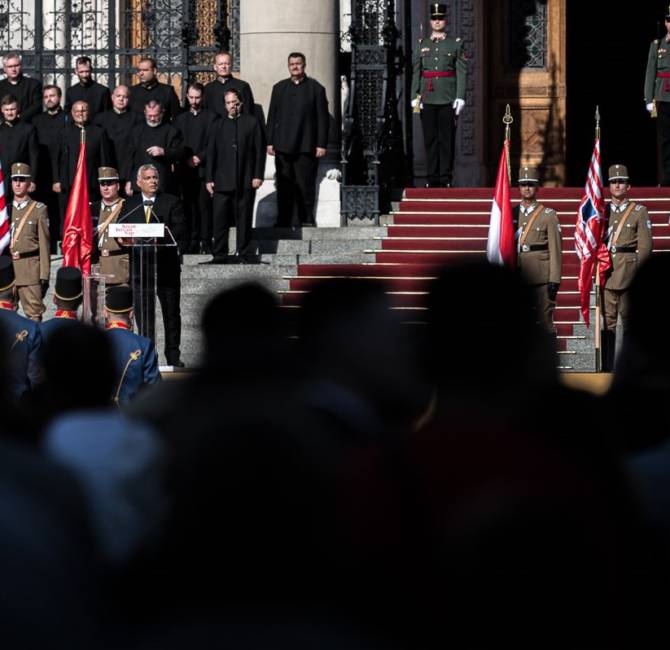By Olivier Bault.
Poland – Jarosław Kaczyński, the leader of Law and Justice (PiS), never made any secret of the fact that at least two consecutive parliamentary terms were needed for PiS to complete and consolidate its reforms. The top priority was thus to renew the United Right’s absolute parliamentary majority on October 13. The United Right is an alliance between PiS and two smaller right-wing parties: United Poland (SP) led by justice minister Zbigniew Ziobro, and Agreement (Porozumienie) led by Jarosław Gowin, who is the science and higher education minister and a deputy Prime Minister. Together, those two parties now have 36 MPs elected from PiS’ electoral lists. Without them, Kaczyński’s party does not hold an absolute majority in the Sejm.
This dependence could already be felt shortly after the elections, with the proposal made by PiS MPs to abolish the current ceiling on the payment of pension contributions. Gowin’s party is opposed to such a move, although the bill could have been passed with the votes of the Left. However, pressured by its ally, PiS decided last week to put this proposal aside for the time being. Jarosław Gowin also distanced himself from the selection by PiS of three candidates for the Constitutional Court when the choice was announced (although Gowin and his party eventually voted in favour of the three nominees last week), to replace judges whose nine-year term of office is coming to an end. Among the three candidates, two are very controversial. While Stanisław Piotrowicz and Krystyna Pawłowicz are undoubtedly experts on law, they were also very active MPs of PiS in the previous parliament. As a member of parliament, Pawłowicz was best known for her strong language, which was often deemed aggressive and insulting by her opponents. As far as Stanisław Piotrowicz is concerned, as head of the Committee on Justice and Human Rights in the Sejm, he was an important player in the process of reforming of the judiciary, which was done in a way that was strongly criticised by the Polish opposition and Brussels. The designation of such candidates came at a time when the President of the Constitutional Court, who was also appointed by a PiS-dominated Sejm, once again stood accused by another judge of the same Court of manipulating judgements for political reasons. President Julia Przyłębska is criticised for assigning cases to judges on the basis of their expected decisions, and for deliberately blocking the review of certain cases. It has to be said that both accusations were also levelled at her predecessor during the time of Donald Tusk’s governments, but not by sitting judges of the Constitutional Court.
As for Zbigniew Ziobro’s United Poland party, it demanded last week that PiS reverse its decision to support the appointment of leftist MP Magdalena Biejat as chair of the parliamentary committee for social policy and family affairs. Although PiS explains that its support is a consequence of the agreed principle that chairs of parliamentary committees should be shared among all parliamentary groups, the view on the right – both within the United Right coalition itself and among the 11 nationalist and liberal-conservative MPs of the Confederation (Konfederacja) – is that appointing a pro-abortion activist as chair of a committee where for a year and a half PiS has been blocking a citizens’ bill aimed at forbidding eugenic abortions is utterly unacceptable.
Moreover, after PiS failed to persuade a few opposition or independent senators to join its ranks in the new Senate, it was confirmed with the election of the new speaker that Kaczyński’s party had lost control of the upper chamber, with only 48 senators out of 100. The new speaker of the Senate is Tomasz Grodzki from the liberal Civic Platform (PO). He was appointed with the votes of all opposition parties. This will not prevent PiS from governing and enacting laws, as the Sejm has the last word in case of disagreements between the two chambers, but it will prevent it from enacting laws by an emergency procedure as it did from time to time during the last parliamentary term. The new speaker of the Senate has promised to do his best for the upper chamber to contribute to better laws based on thorough, honest work. However, one of his first announcements was that he intended to pay a visit to the American Senate, where he will thank the authors of a letter dating from 2016 which was highly critical of Beata Szydło’s government on the subject of the rule of law.
At government level, there have been no major changes apart from some minor reorganisation of ministries, such as the creation of a new climate ministry separate from the environment ministry. Prime Minister Mateusz Morawiecki, as well as deputy Prime Ministers Jarosław Gowin and Piotr Gliński, who is also the culture and national heritage minister, have all kept their posts. Zbigniew Ziobro is still the Minister for Justice, and there has been no change either at the top of the foreign affairs, defence and interior ministries. There is a new finance minister, Tadeusz Kościński, but he was already a secretary of state in the Ministry of Finance in the previous Morawiecki government.
After the October elections the main goal of the new Morawiecki government is now to give life to the generous (and costly) social promises made by PiS, in the context of a predicted slowdown of the economy and while trying to balance the budget in 2020 as announced before the elections. This dilemma explains the temptation to abolish the ceiling for pension contributions and to increase certain taxes, such as those on cigarettes, alcohol and motor fuel. Morawiecki’s task will be made more difficult in an electoral year, as his government will have to ensure President Andrzej Duda’s re-election in May 2020. It would indeed be a greater blow for PiS to lose the presidency than the Senate, as the Polish President has the power to veto laws enacted by parliament. And with only 235 MPs out of 460, PiS and its allies do not have the necessary majority in the Sejm to overturn a presidential veto.




